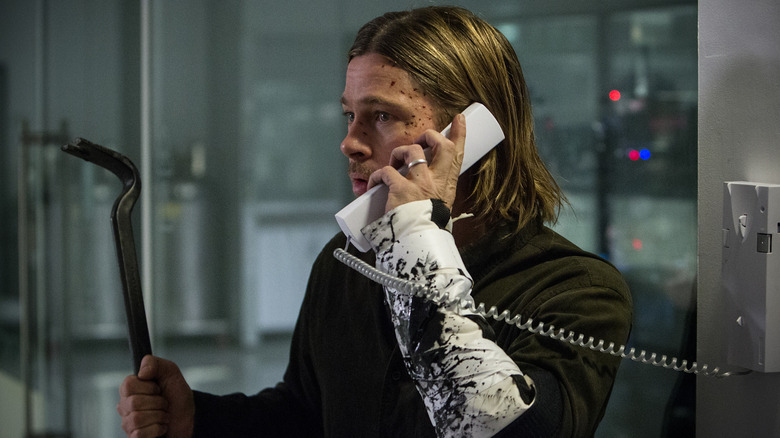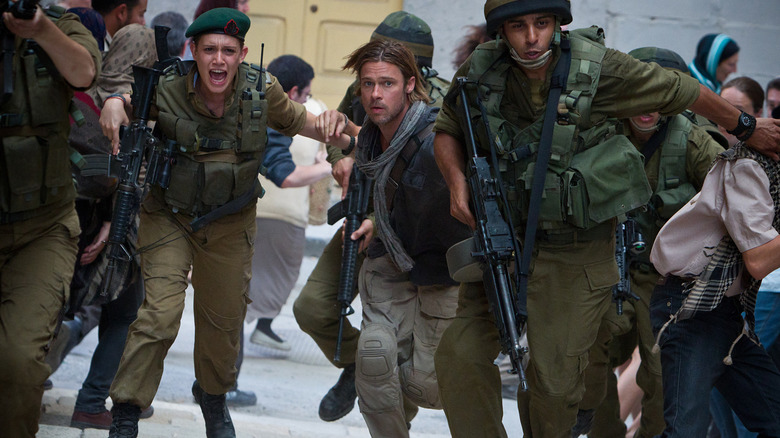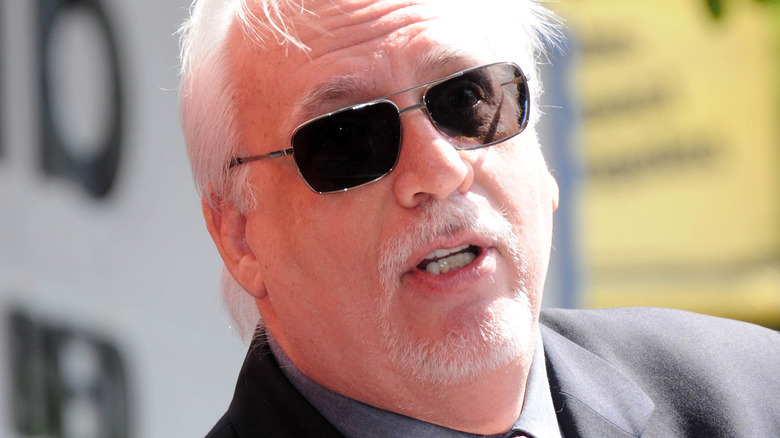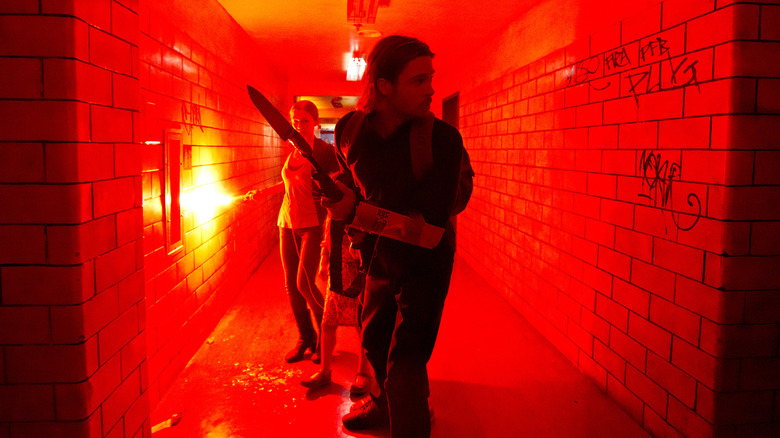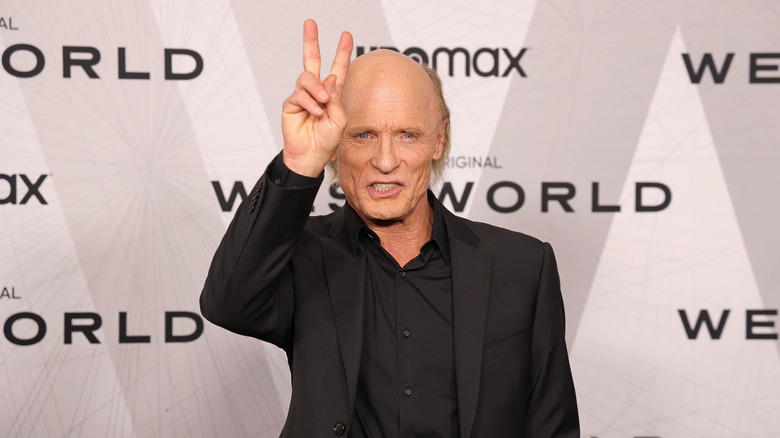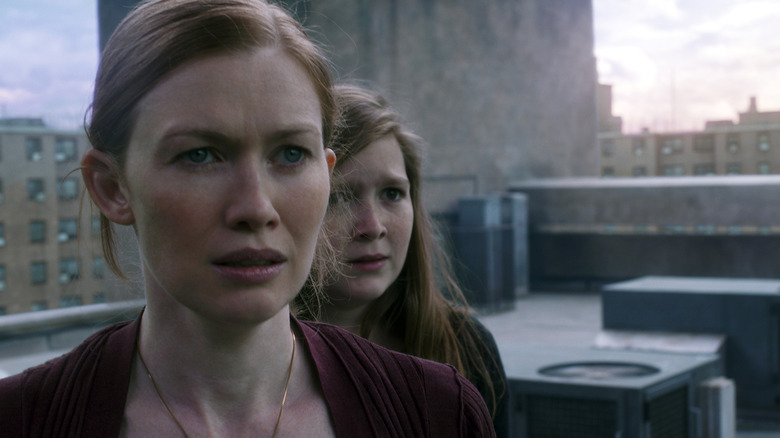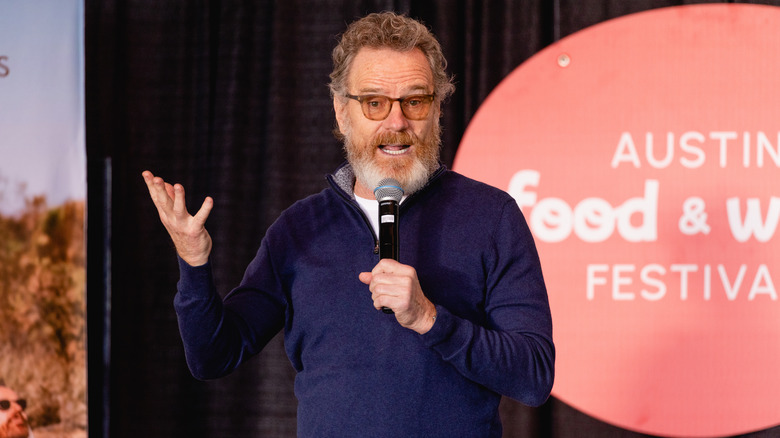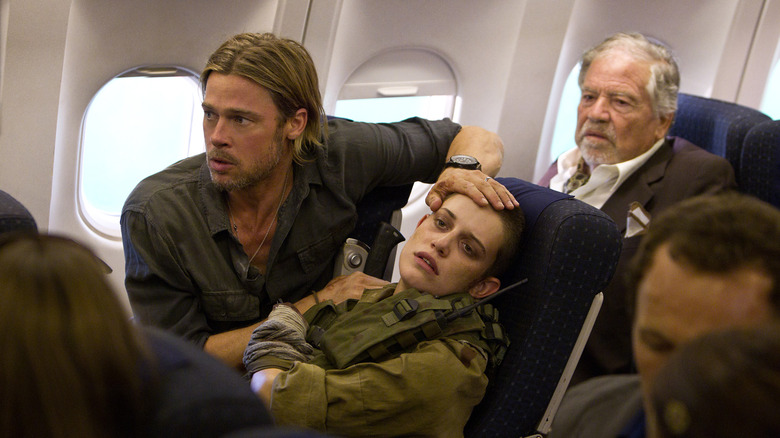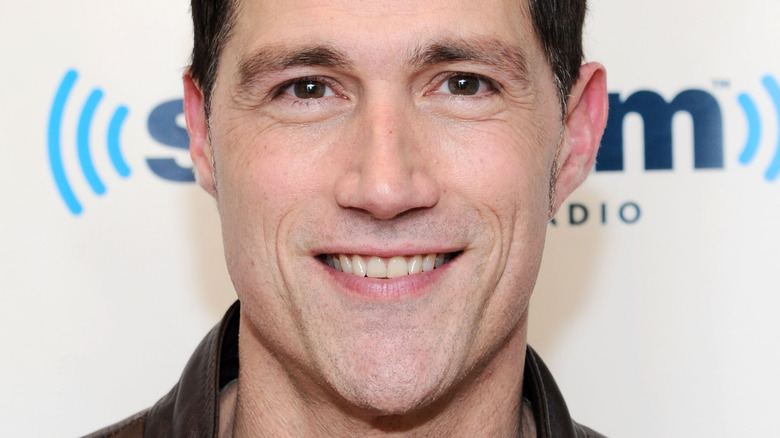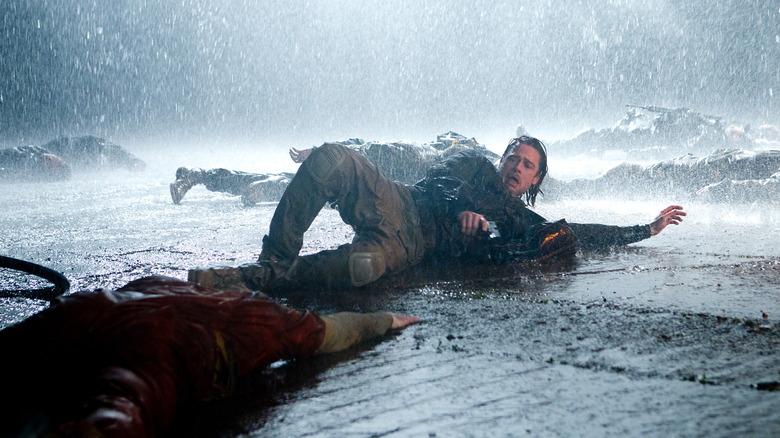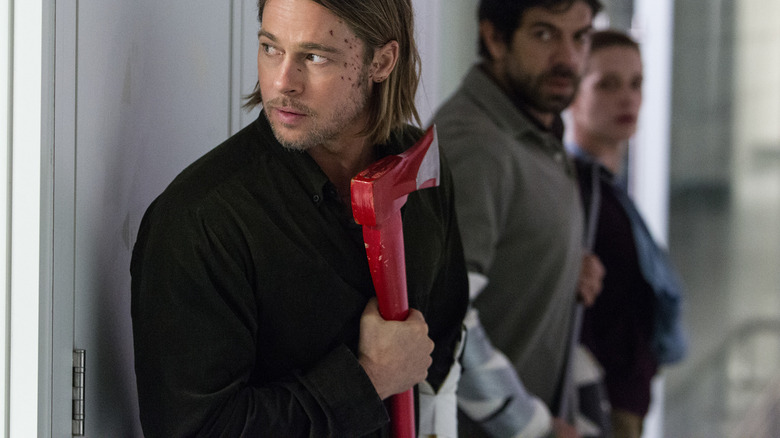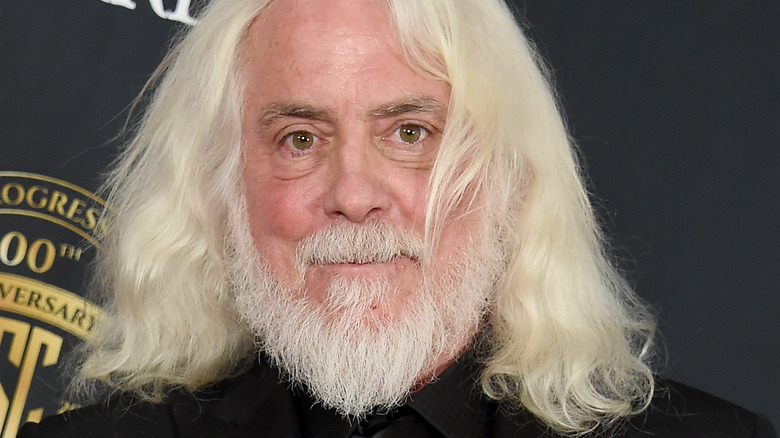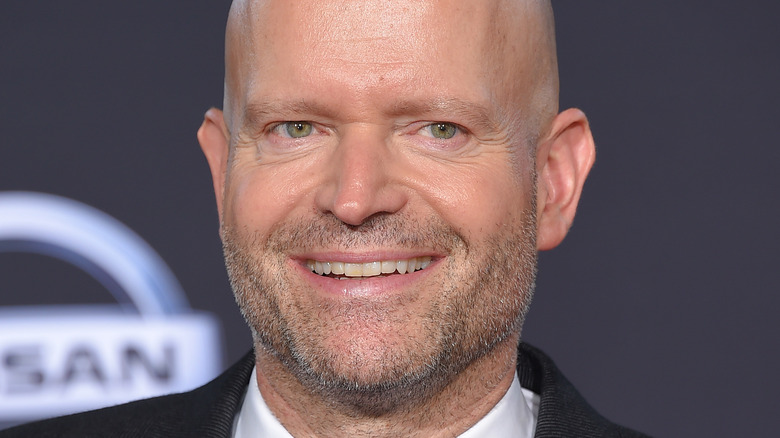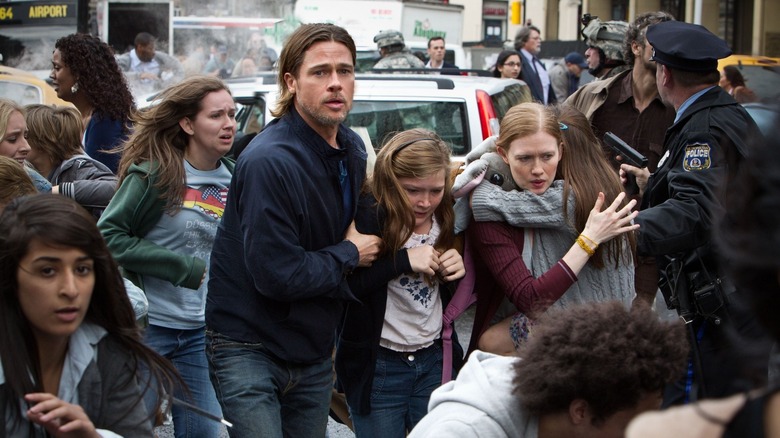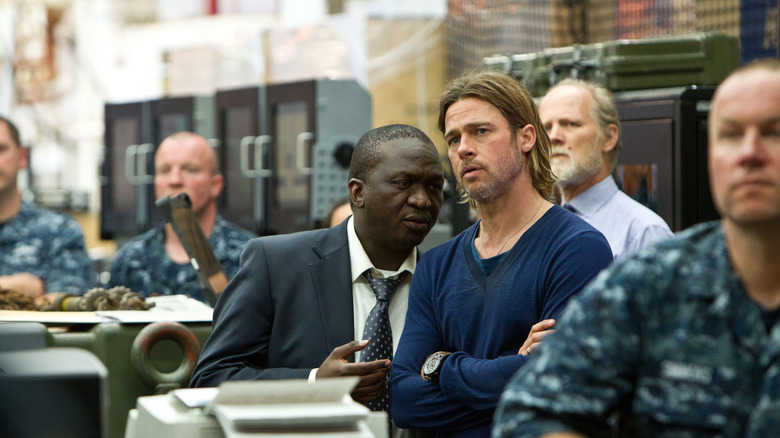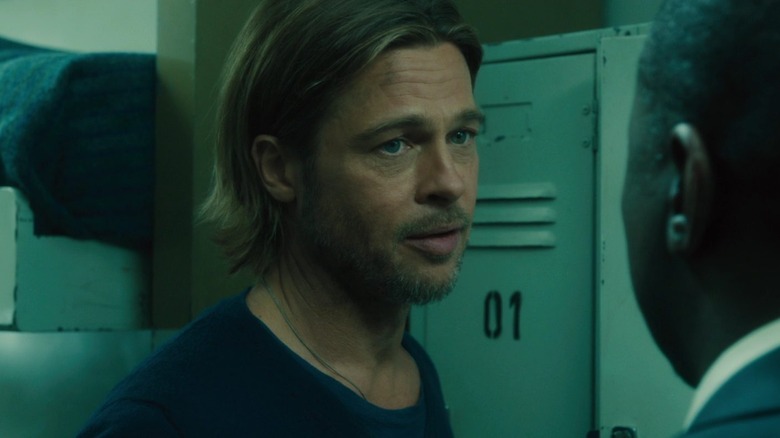The Complicated History Behind World War Z Explained
As anyone who watched a movie centered on the undead knows, zombies will always keep coming after you. Their lust for brains and human flesh is just too great, so they will always pursue new targets to satisfy their hunger. In a real-world coincidence, zombie movies have proven equally enduring in pop culture. That constant popularity of zombie features extends to one of the biggest, at least in terms of scale, motion pictures in the subgenre: "World War Z." An adaptation of the Max Brooks novel of the same name, "World War Z" follows Gerry Lane (Brad Pitt), a man who tries to keep his family safe during a zombie apocalypse before getting asked to investigate just where this whole cataclysm began. Lots of globe-trotting and close calls with the undead ensue.
On paper, it makes sense why a "World War Z" movie with Brad Pitt would get green-lit by Paramount Pictures executives. Pitt is popular, and so are zombies, so put them together and you must have a box office smash. But getting "World War Z" to the big screen was an arduous experience, with this feature struggling mightily in its journey to movie theaters. Experiencing all this turmoil was a nightmare for the key creative voices involved in "World War Z," but all that chaos does at least ensure that breaking down the complicated history of "World War Z" is a fascinating experience.
The original vision for World War Z as a movie
The journey of "World War Z" as a film began years before it hit the big screen, with Marc Forster joining the project as its director in 2008 while J. Michael Straczynski was the first person hired to pen the screenplay for the film adaptation of the Max Brooks book of the same name. Forster's participation here was intriguing in terms of timing since it came a few months before his feature "Quantum of Solace" debuted and established that he could direct blockbuster-level movies. In talking about his vision for the film, Forster used conspiracy thrillers of the 1970s, namely "All the President's Men," as touchstones for what he wanted the vibe of "World War Z" to be.
There was also the fact that the film was initially set up at Plan B Productions, a production company founded in part by Brad Pitt, after a bidding war with Leonardo DiCaprio's Appian Way. This outfit had signed a first-look deal with Paramount Pictures three years earlier in 2005, a deal that had yielded award-season darlings like "The Curious Case of Benjamin Button" and "Babel." None of these initial collaborations, though, had the kind of widespread appeal of a zombie action movie like "World War Z." The importance of this film to the Plan B and Paramount Pictures relationship meant that, even as Forster aimed to make the new "All the President's Men," Paramount brass likely would've settled for the director just rehashing "Avatar" or other past box office juggernauts.
The first draft of World War Z
When screenwriter J. Michael Straczynski first talked to MTV in 2008 about his draft for "World War Z," an element he kept on emphasizing was the sheer scope of the movie. For Straczynski, it was so exciting to make a zombie movie that had such a massive scale considering how many iconic zombie films were much more restrained. He also presented an intriguing meta element related to the original Max Brooks novel "World War Z": Straczynski originally planned to have the book written in-universe during the movie, so audiences would see the film's lead writing down events as the story progressed before ending "World War Z" with the text fully written.
It was a clever idea in that it figured out how to adapt a book (which is itself comprised of interviews and more clinical recalls and clippings about the zombie apocalypse that are presented in raw form by the protagonist author) that seemed difficult to translate to the big screen. Straczynski expressed further excitement over collaborating with director Marc Forster on what he described as a last draft of the script before the movie got up and running sometime in 2009. Unfortunately, many of these ideas would not make it into the final cut. Stracyznski's approach to adapting this text was so removed from the final cut of "World War Z" that he only received a "story by" credit on the finished film.
The struggles for financing on World War Z
Even before reshoots shot up its budget significantly, "World War Z" was always intended to be costlier than your average zombie movie. "World War Z" was going to star Brad Pitt, for one thing, while its expansive global scale ensured that it was always going to cost a pretty penny to realize. Even with all these elements baked into the movie from the get-go, "World War Z," at one point, looked too expensive for Paramount Pictures to finance and release.
A few months before principal photography was supposed to start in early 2011, reports emerged that Paramount Pictures needed to find a co-financier for "World War Z." The stakes here were so significant that the project could be scrapped if another production company didn't join in to finance its $150 million budget. However, a savior for this zombie blockbuster came about in the form of Skydance Productions, which had a co-financing deal with Paramount Pictures at the time. The studio stepped in to help cover the budget of "World War Z," thus ensuring that it could go forward into production. Brad Pitt may have saved what was left of the world in the film, but Skydance saved "Word War Z" itself.
Ed Harris was pursued for World War Z
As the cast for "World War Z" began to assemble, the production began pursuing an award-season darling for a key supporting role. In June 2011, Ed Harris was reported to be in talks to take on a role in the feature. There was no word on who he would be playing, though given his track record as a performer, it's likely Harris would've been a fine fit for whatever role "World War Z" threw at the actor. Up to this point in his career, Harris had primarily done more grounded projects with minimal CGI (he would later have roles in VFX-heavy titles like "Gravity" and "Geostorm"), so "World War Z" could've been an interesting departure from his norms.
"Could've," though, is the operative word there, as Harris ended up passing on "World War Z." There was never any indication of what led to Harris saying no to such a high-profile project, but any hopes of seeing Pitt and Harris interacting on the big screen were dashed. If there's any consolation to those mourning this pairing never coming to fruition, though, it's that Harris may not have ended up appearing in "World War Z" even if he'd signed on. Given that Matthew Fox was largely cut from the feature after lengthy reshoots, there's a good chance Ed Harris may have also been largely left on the cutting room floor. Perhaps Ed Harris dodged a bullet not jumping aboard this project.
The original climax of World War Z
The biggest problem during the production of "World War Z" came with its initial ending. In an openly vulnerable piece for Vanity Fair, the crew behind the film opened up about how the original action-packed finale to this film simply didn't work. That initial climax would see Brad Pitt's protagonist travel to Russia, where he would end up fighting off swarms of zombies. There was lots of expansive carnage in this set piece, but the people behind this movie felt like the character details of "World War Z" were getting lost in all the mayhem.
There was also another reason for changing "World War Z" so drastically: Pitt explained to Entertainment Weekly that one reason he signed on for the movie in the first place was that he wanted to explore weighty sociopolitical ideas within the confines of a zombie action movie. The idea of merging exciting zombie fighting with hefty themes sounded great to Pitt, but once "World War Z" enter post-production, it was decided that the film was just too heavy. Reshoots heavily centered on the third act were then enacted to ensure that "World War Z" was much more of a fun movie than a thoughtful lone. The various reasons behind overhauling the film's climax coalesced to ensure that Paramount Pictures spent millions reshaping this Brad Pitt star vehicle.
Bryan Cranston almost had a small World War Z role
In the summer of 2011, the world was gearing up for the final two seasons of "Breaking Bad." The acclaimed program was nearing the end of the road, and that didn't just mean the inevitable closure of Walter White's journey for super-fans of the show. It also meant that the main actors of "Breaking Bad" were starting to keep their eyes peeled for new acting opportunities beyond this crime drama. The hit series' leading man Bryan Cranston almost secured an especially interesting gig in the twilight years of this show by entering into talks for a very small role in "World War Z."
There was no word on who Cranston would've been playing in the movie, but the part was said to be a juicy one. While it seemed like exciting casting, it never came to pass. Cranston informed Film School Rejects in September 2011 that he wasn't in "World War Z" after all. The actor explained that he was really eager to do the movie and work with director Marc Forster, but scheduling conflicts guaranteed that he couldn't be a part of the movie. Since then, there's been no further information on who Cranston would've played in this blockbuster, but perhaps it's best to leave this prospective casting in the past. After all, Cranston missing out on "World War Z" gave him so much more time to fixate on the final episodes of "Breaking Bad."
The overhauling of World War Z's ending
In June 2012, the news broke: "World War Z" was in trouble. Though it had started life with a lot of hype surrounding the idea of Brad Pitt anchoring a big-budget zombie blockbuster, the feature was now as tormented as any shambling corpse. The first piece of news on this development involved Damon Lindelof getting hired to revamp the movie's third act. Lindelof came up with the idea of how to streamline the finale and "The Cabin in the Woods" director Drew Goddard was then hired to write down a new resolution based on Lindelof's concepts.
Lindelof later explained to The Hollywood Reporter that he was hired to work on "World War Z" because Brad Pitt had nearly starred in "Prometheus," another blockbuster penned by Lindelof. With a dynamic established between the two men, Lindelof was called in to listen to Pitt explain what the flaws in the then-current version of "World War Z" were. Lindelof expressed sympathy for how the movie had ended up going too big in its original third act. Traditional zombie fare had often been intimate in scope, so Lindelof could see the logic of a massive climax being necessary to differentiate "World War Z" from typical zombie fare. Of course, that tactic ended up backfiring terribly and required folks like Lindelof and Goddard to write up a radically new ending for the troubled "World War Z."
Matthew Fox's strangely tiny role in World War Z
The saga of Matthew Fox's participation in "World War Z" could be a movie unto itself. In June 2011, just before shooting began, it was first reported that Fox was set to be a part of the film's cast. However, just a few weeks later, it was revealed that Fox would not be taking part in this zombie blockbuster after all because of scheduling conflicts with "Alex Cross." That's a very normal turn of events, as many actors are reported to be in talks for a motion picture but don't end up getting cast. What makes this peculiar is that, in August 2011, The Hollywood Reporter confirmed that Fox was in the movie after all, with the actor simply juggling "Cross" and "World War Z" simultaneously.
Talking to Extra TV in February 2013, Fox expressed excitement over how "World War Z" was shaping up by saying it'd be unlike any other zombie movie audiences had ever seen. Though he was playing an effective hype man, Fox's role in the final cut of "World War Z" ended up being so minimal that he only appears in a few seconds of the final cut as a pilot. Movies.com (via The Huffington Post) reported that the original ending to "World War Z" before its extensive reshoots heavily involved Fox's character, who would've started a relationship with the protagonist's wife. That plot thread and nearly all of Fox's role were deleted from "World War Z," leaving him barely visible in the final cut.
That time a SWAT team raided the World War Z set
Even before those infamous extensive reshoots, the production of "World War Z" was plagued by constant problems. Case in point: In October 2011, during filming, a warehouse holding weapons for the film was raided by a SWAT team. The weapons were largely assault rifles, with the issue here being that these were actually functional objects rather than the non-functional entities that paperwork suggested they were. Given that transportation of functional weapons like these was illegal, swift action involving law enforcement was taken, resulting in the SWAT team cracking down on a warehouse full of guns that were once planned for usage in "World War Z."
Despite such a massive show made out of securing the weapons, no legal processing would come about this matter. In February 2012, it was revealed that Hungarian authorities had failed to figure out who was responsible for all those guns. Unable to pin down a guilty party, charges over the matter were dropped. The whole thing generated some headlines for a few months thanks to a Brad Pitt movie getting embroiled in foreign legal trouble, but it mostly proved to be much ado about nothing. In hindsight, though, this entire event is just one of many instances where "World War Z" kept on generating the kinds of news headlines that studio executives have nightmares about.
The release date shift for World War Z
Initially, "World War Z" was planned to drop a lot of global zombie mayhem on moviegoers at an unorthodox time of the year. Rather than gunning for Halloween, "World War Z" was set for a December 21, 2012 debut. Though not ordinarily the time of the year one expects to see a zombie movie, it is an opportune area for launching new big-budget blockbusters like "World War Z." Plus, Brad Pitt had experience launching crowdpleaser hits in December thanks to "Ocean's Eleven" and "Ocean's Twelve." In so many ways, the date seemed perfect as a launchpad for this feature.
However, by the time March 2012 rolled around, Paramount decided to shift its plans around. The studio announced that "World War Z" would now premiere six months later than expected, in June 2013. In hindsight, the prolonged delay gave everyone involved in "World War Z" plenty of time to pull off extensive reshoots for the third act. This postponement also gave "World War Z" a prime summertime premiere that would allow it to take advantage of the 4th of July frame. The box office track record of Pitt even played positively into this new date since the actor scored a financial winner with "Ocean's Thirteen" in June 2007. A delay is rarely welcome news, but "World War Z" still got a prime date when it got postponed.
Robert Richardson's cinematography credit skirmish on World War Z
As if the scramble to get a proper third act for "World War Z" wasn't enough for major behind-the-scenes troubles on this feature, the film was also rife with problems with its cinematography. Original cinematographer Robert Richardson recalled to The Hollywood Reporter in 2016 that he was initially hired to lens the movie and worked incredibly hard to figure out the look of the feature. Originally, he seemed to be in the same creative step with director Marc Forster and Paramount Pictures executives. Unfortunately, Richardson would quickly discover that all of his plans for how to shoot the movie had been abandoned.
Further problems emerged once Paramount brass decided that "World War Z" would be released in digital 3D, a format that Richardson's original look for the movie didn't account for. With "World War Z" now straying comically far from Richardson's original vision, he didn't want his name to be on this potential blockbuster. This was a significant loss for "World War Z" given the esteemed pedigree Richardson had cultivated working with filmmakers like Quentin Tarantino and Martin Scorsese. Ben Seresin would eventually step into the role of cinematographer on the feature and bringing this tormented aspect of "World War Z" to fruition.
Marc Forster's feelings about World War Z being in 3D
Per CinemaBlend, the 3D release of "World War Z" was not made public knowledge until the feature's Super Bowl commercial. Despite the movie being under the microscope of the entertainment press for so many months because of its post-production woes, its conversion into the third dimension was somehow kept under wraps. While it was a sudden announcement, it shouldn't be a surprise that "World War Z" was shown in digital 3D. This Brad Pitt star vehicle was released in 2013 when every movie studio was still chasing after that movie's extraordinary box office boosted by 3D ticket prices.
The abrupt nature of "World War Z" being converted to digital 3D appears to be reflected in comments from director Marc Forster to Collider in March 2013, with the director noting that he had concerns over how the fast cuts and handheld camerawork in "World War Z" would translate to digital 3D. Forster noted that he did think the steps of converting a 2D movie to a new dimension were interesting and that he wanted to explore the technology more in the future. While Forster wasn't dismissive of digital 3D filmmaking, his comments about how it was implemented during its presence in "World War Z" indicate this was a hurried decision. No wonder the general public wasn't aware of it being shown in 3D until that fateful Super Bowl Sunday.
World War Z's controversial changes to the source material
While "World War Z" won over more critics than it didn't, the feature film was frequently lambasted by fans of its source material for deviating far too much from the novel that inspired it. The key difference between the two versions of "World War Z" was, among many other variations, realism. The "World War Z" novel by Max Brooks was praised for getting into the nitty-gritty of how a zombie apocalypse could occur while making the eventual "Night of the Living Dead" scenario feels so tangible. It was "The Last of Us" before "The Last of Us" ever existed in making a post-apocalyptic zombie story feel so deeply human and rooted in everyday reality.
By contrast, the movie was standard action fare that featured cartoonishly powerful zombies and little of the substantive qualities that got the original "World War Z" book to be so popular in the first place. Plus, limiting the scope of the movie to just Brad Pitt's protagonist meant that the "World War Z" movie missed out on the fascinating global events that the "World War Z" novel covered. In countless ways, "World War Z" disappointed longtime fans of the original novel and provided a new go-to example of movies that frustratingly abandon the most idiosyncratic parts of their source material.
World War Z's box office run
Before the summer of 2013 began, Box Office Mojo published its predictions for what movies would end up being the biggest of the summer. "World War Z" came in at number 12, with the website predicting that the film wouldn't do terribly, but that it would fare better internationally than it would in domestic markets. That seemed to sum up the general pre-release attitude towards "World War Z" before its release, with most predicting it just wouldn't thrive at the box office. Box Office Mojo would further report that even Paramount Pictures wasn't expecting record-breaking sums of cash from the pic's opening weekend, with the studio projecting it would gross just under or over $40 million on opening weekend.
But then "World War Z" managed to surprise everyone with a hefty $66 million debut, a sizeable haul despite this blockbuster opening against "Monsters University" and just one week after "Man of Steel." The combination of Brad Pitt and large-scale zombie attacks was just too good for general audiences to miss out on. In its worldwide box office run, "World War Z" would manage an astonishing $531.8 million, including $202.7 million in North America alone. Even on a massive $190 million budget, "World War Z" was a clearly profitable exercise. "World War Z" didn't inspire much box office confidence before it debuted, but it eventually ravaged the summer moviegoing landscape.
The unmade World War Z sequel
As early as 2012, Paramount Pictures brass and Brad Pitt were both excitedly talking about the possibility that "World War Z" could go on for multiple movies. With a global zombie apocalypse, there was certainly enough material here to span more than one motion picture, especially if they tapped into some of the book material left on the table. After the film's lucrative opening weekend, Paramount began to really push forward on plans for a follow-up. J.A. Bayona was later hired to direct this prospective sequel while a June 2017 release date was announced in 2015. With a flurry of activity surrounding this sequel, "World War Z 2" was looking like a sure thing.
After a few more years of development and Bayona's departure from the director's chair, David Fincher entered talks to helm this sequel, which would've reunited this acclaimed auteur with his "Fight Club" and "The Curious Case of Benjamin Button" leading man. By 2018, five years after the first "World War Z" had debuted, Fincher's sequel was beginning to ramp up pre-production. However, in February 2019, Paramount Pictures canned "World War Z 2," a rare instance of Hollywood canceling the sequel to a blockbuster smash hit. Pitt was reportedly furious over the decision, which came down to Paramount Pictures brass dragging their feet on giving the movie a proper green light. The lack of enthusiasm from studio brass finally led to this sequel perishing after years of development.
